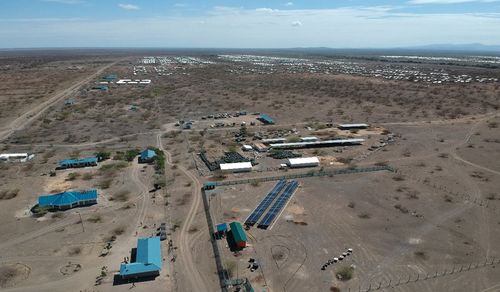Expanding mini-grids during Covid-19 – Experiences from Kalobeyei
Overview [Draft]
In the Kalobeyei Settlement and host community town, ESDS Kenya supported the Covid-19 response measures of local authorities and UNHCR by electrifying facilities that enhance efforts to contain the pandemic. In total, 3 health facilities, providing medical services to refugees and the host community, 4 schools, earmarked as isolation centers, and 1 horticultural farm run by WFP which sustains the food supply were connected to two mini-grids in the Kalobeyei Settlement and Town. As rapid response measure, they have an immediate impact on mitigating Covid-19, while they also improve the energy services in Kalobeyei beyond the pandemic and align with the broader objective of ESDS.
Article
The Kakuma Refugee Camp and the Kalobeyei Integrated Settlement, located in Turkana County at the north-western border of Kenya, currently host close to 200,000 refugees from Eastern and Central Africa. Albeit donors and humanitarian organizations installed mini-grids and the nearby Kakuma town is connected to a sub-station of the national grid, only 5 percentage of households in the camps had reliable access to electricity in 2019 according to UNHCR, while many systems, including the sub-station, run on diesel generators.
To remedy this situation and as part of its efforts facilitate the market-entry of the private sector in providing sustainable energy, EnDev supported the installation of two mini-grids in the Kalobeyei Settlement Village 1 and Host Community Town in cooperation with national and local authorities and UNHCR. The mini-grids are run by a private company on a self-sustaining business model and provide electricity for households from the refugee and host community, SMEs and social institutions at a tariff close to the national level. This was achieved by offering a grant to cover a portion of the capital investment and Results-based Financing (RBF) to the operating company. Since September 2019, both mini-grids are operational and serve close to 600 households, businesses and social institutions.
They provide 60kWp with 120kWh storage in the settlement, and 20kWp with 60kWh storage in the host town. A 100kVA diesel-generator serves as back-up for the mini-grid in the settlement and was sized based on estimated consumption patterns. All demand sites in the settlement are spread around 4km², with the distribution lines extending to Xkm and covering customers in proximity to the mini-grids. Customers can activate via pre-paid tokens their electricity supply and have meters that measure consumption. In the initial operation period, average monthly electricity consumption of households in settlement and host town experienced a nearly six-fold rise and stands currently at about 6kWh for both. This shows the contribution of the mini-grids in improving the energy access of previously excluded populations as well as the existence of demand for high-tier electricity supply.
Given this success, ESDS Kenya, acting complementary to EnDev, is commissioned to facilitate the expansion of the mini-grids into the Villages 2 and 3 of the Kalobeyei Settlement. This takes place in close coordination with the Turkana County government and serves its Kalobeyei Integrated Socio-Economic Development Plan (KISEDP). As market-studies by EnDev suggested that the majority of refugee households cannot afford the current, already subsidized tariff, financing schemes are being explored as support measures to reach a broad consumer base. As a second pillar of its activities, ESDS Kenya assists UNHCR in its transition towards a cleaner energy supply by supporting the solarization of the infrastructure of the facilities it maintains in Kalobeyei and Kakuma.
However, the outbreak of COVID-19 necessitated an adjustment to these plans: With the objective to provide immediate and high-impact support to Kalobeyei’s inhabitants, ESDS Kenya prioritized the connection of facilities to the mini-grids that reinforce response measures to the pandemic. This included 3 health facilities, 2 in the settlement and one in the host town, 4 learning institutions in the settlement that serve as isolation centers, and a WFP horticultural farm that sustains the food supply.
These measures improve the preparedness of the Kalobeyei Settlements and Host Community Town to COVID-19 and are being/could be completed despite the restrictions on movement and interaction put in place by authorities. With the first infection reported on 25th May 2020 in Kakuma and Kalobeyei, the connected facilities take a significant role in curbing the spread of the virus and keeping the situation under control.
Notwithstanding the fact that the mini-grid connection of the facilitates took place under light of the pandemic, the impact of these activities goes beyond it. The electricity-access of the facilities improves health care services and offers learning opportunities for refugee and host community households that enhance the quality of life for the inhabitants of Kalobeyei.
In subsequent steps, ESDS Kenya will work towards sustaining the operation and maintenance of the distribution lines with private sector involvement and refocus its attention to upscaling the mini-grids by connecting additional customers in the other villages of the settlement and making the electricity more affordable.




















